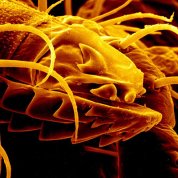
On the Cover
Tick mouth. Image shows how the design of the mouth makes ticks generally difficult to remove once they have attached for a blood meal. A strategic research plan by NIH aims to build on and accelerate new and existing research initiatives to improve scientific understanding of ticks and the pathogens they may transmit, and to develop tools to better diagnose, prevent and treat tickborne illnesses.
NIAID




